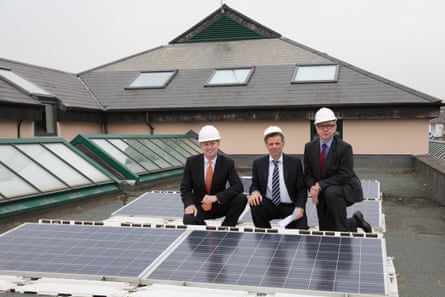A charitable project that has installed more than 1,000 solar panels on schools in England and Wales will close next summer if government proposals to cut support for renewable energy go ahead.
Campaigners said on Wednesday that the “solar schools” project run by environmental charity 10:10 would become unsustainable under government proposals to dramatically cut the feed-in tariff for householders and communities who install solar panels on rooftops.
Michael Gove took to a school rooftop in Barnes last year as then education secretary, promoting solar panels as a “sensible choice” for schools that could financially benefit them and engage pupils in environmental issues. The Department for Education said it would promote solar on schools.
Amy Cameron, campaign manager at 10:10, described the planned 87% cut to the solar incentive scheme as “nonsensical”.
“The messages coming out of the government don’t make sense. One of the key aims of the feed-in tariff was supposed to be around public engagement and nowhere is this more true than in schools. Schools say that is has opened the doors to educate both pupils and adults about energy and climate change,” she told the Guardian.
Schools already registered now face a race to fundraise and install the panels before the year in which they can take advantage of the current rates expires. 10:10, which has supported 81 schools with the project, says it is now turning away interested schools.
Plans to also support the deployment of solar panels on mosques are now very likely to be shelved.
It is estimated that the average school could earn £8,000 annually from switching to solar. Friends of the Earth say that installing panels on every school in the country would save carbon emissions equivalent to taking 110,000 cars off the road.

On Monday, children from Fox primary school in west London, which inspired the set-up of solar schools in 2011, delivered a petition to the Department of Energy and Climate Change (Decc), asking them to reconsider the cuts for larger installations. The school’s 100 solar panels provide for almost all of the school’s electricity demand.
Executive headteacher, Paul Cotter, said: “It simply cannot be the right decision to block more schools from benefiting from solar power. We have big roofs, lots of daytime energy use - and children whose futures depend on a rapid switch to clean energy. Yet that is exactly what will happen if the government goes through with these cuts.”
Campaigners and industry have warned that the changes to the feed-in tariff could lead to thousands of job losses and stifle the uptake of solar power.
A Decc spokesperson said: “Our priority is to keep bills as low as possible for hardworking families and businesses, while reducing our emissions in the most cost-effective way. The government’s support for solar has driven down the cost of the technology significantly and we delivered more than the promised subsidy amount to the industry. Our action will protect existing investment whilst providing value for money for bill payers.”

Comments (…)
Sign in or create your Guardian account to join the discussion